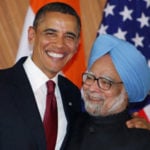
President Obama and Prime Minister Singh at their press conference in New Delhi. Credit: PTI.
Exceeding the expectations of many, President Obama’s just-concluded state visit to India succeeded in closing the sentiment-substance gap that had come to define bilateral affairs during his administration. For the past two years, his approach toward India was something of a paradox. There is little doubt about Obama’s esteem toward the country and its leaders – indeed this was on prominent display over the last few days. Yet until now the administration found it difficult to translate expressions of good will into concrete policy action.
Mr. Obama’s trip began on several inauspicious notes that led many to downplay its prospects for success. Indian Foreign Secretary Nirupama Rao cautioned against expecting “big bang” outcomes. One commentator noted that Indian disquiet meant that the trip was in trouble even before the president had boarded Air Force One, while another lamented “how an alliance that had seemed so electrifying – indeed, one that had all the hallmarks of a ‘paradigm shift’ in international relations – has been so quickly squandered.”
Contributing to the low expectations was the trip’s maladroit timing and messaging. That Mr. Obama showed up in the middle of Diwali, the most important of Hindu religious holidays, created the impression that he was fleeing troubles at home seemingly oblivious to the burdens placed on his hosts. That the president’s Democratic Party received a severe electoral drubbing just days earlier meant that he arrived in India a much diminished political figure. Indeed, it was a sign of his weakened position that the White House reportedly pulled out of visiting the Golden Temple in Amritsar, the holiest shrine in Sikhism, for fear that Americans would mistake the obligatory head covering for Muslim garb. The White House also put out the word that the trip was essentially a jobs-hunting mission, a formulation that cast the president’s role as pitchman-in-chief instead of a far-sighted statesman.
By the time he departed India, however, Mr. Obama had imparted a new dynamism to bilateral ties as well as delighted New Delhi elites once uncertain of his commitment to the relationship. Tthe Times of India proclaimed that the president “has India gushing.” Reporting on the president’s giddily-received address to a joint session of the Indian Parliament, the newspaper noted that the “audience lapped it up, with no less than 25 rounds of applause in a barely 45-minute speech. The cherry on the cake, of course, was the ‘Jai Hind’ [Hail India] with which he concluded.” (Click here for the text of the president’s remarks and here for the video. For more on the speech, see Manasi Kakatkar-Kulkarni’s post.)
Mr. Obama made a series of dramatic gestures that gratified status-conscious Indian leaders and gave substance to his oft-repeated vision of India as an “indispensable partner of the 21st century.” The headline moment was his unexpected endorsement of New Delhi’s long-standing bid for permanent membership on the United Nations Security Council, an act that drew hearty applause from parliamentarians. Less than a week earlier, he had downplayed prospects for movement on the issue and even officials in New Delhi were reportedly taken by surprise. But as one U.S. official states, “no one wanted to pre-empt the president on what was going to be the crowning glory of the trip.”
Mr. Obama also announced the loosening of U.S. controls on the export of sensitive technology to India, as well as support for Indian membership in important nonproliferation regimes, including the Nuclear Suppliers Group that was originally created to blunt New Delhi’s drive for nuclear weapons. And with his statements denouncing Pakistani use of jihadi proxies, foreswearing a diplomatic role in the Kashmir controversy and clarifying the U.S. course in Afghanistan, the president provided needed reassurance to Indian leaders suspicious of America’s approach toward managing security affairs in South Asia.
To be sure, U.S. support for India’s Security Council aspirations will have little practical effect in the foreseeable future, given how the question entails a multiplicity of players engaged in contentious, interminable negotiation. But it does put to rest apprehensions in New Delhi that Washington is willing to sacrifice Indian equities in the pursuit of relations with Beijing and Islamabad.
Yet if Mr. Obama checked off many of the items on India’s wish list, he may have departed the country wondering whether New Delhi would ever muster the political fortitude to begin accommodating U.S. desires. On the eve of the visit, New Delhi signed the Convention on Supplementary Compensation for Nuclear Damage in an effort to allay U.S. concerns about the stricter limits of its own nuclear liability law. But the resulting confusion over which instrument takes precedence means that U.S. companies will remain hesitant to engage in nuclear commerce with India – one of the very things that the nuclear cooperation accord was suppose to bring about.
Indecision in New Delhi over the pace and scope of economic reform will continue to frustrate U.S. desires for greater commercial interaction. Indian leaders also are unlikely to heed the president’s call to support Western policies on Iran and Myanmar. And one-off defense contracts aside, New Delhi still seems unwilling to countenance the full-fledged strategic collaboration Washington envisions. As Sumit Ganguly points out, there is not yet much sustained discussion in India about what it brings to the table.
As the trip’s warm afterglow begins to fade in the months ahead, Americans are bound to question whether India is living up to its side of the grand bargain that first George W. Bush and now Barack Obama have laid out.